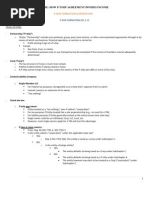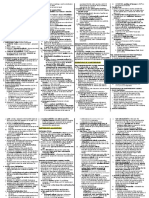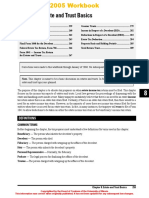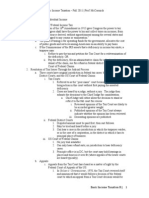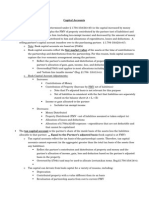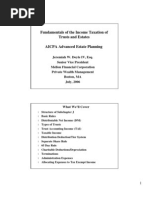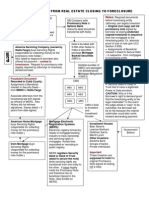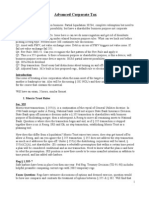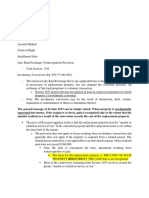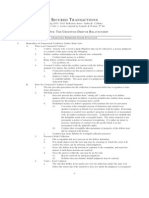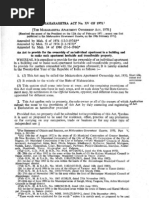Gift and Estate Taxes
Gift and Estate Taxes
Uploaded by
nottingham03290Copyright:
Available Formats
Gift and Estate Taxes
Gift and Estate Taxes
Uploaded by
nottingham03290Copyright
Available Formats
Share this document
Did you find this document useful?
Is this content inappropriate?
Copyright:
Available Formats
Gift and Estate Taxes
Gift and Estate Taxes
Uploaded by
nottingham03290Copyright:
Available Formats
CHAPTER 17 THE FEDERAL GIFT AND ESTATE TAXES Based on West Federal Taxation, Corporations, Partnerships, Estates, &
Trusts, 2001 ed. I.TRANSFER TAXES IN GENERAL Excise taxes (or transfer taxes) are based on the value of the property transferred not the income derived from the property. We cover two main excises taxes: Federal Gift Tax and Federal Estate Tax A.NATURE OF TAXES p.17-2 Estate tax is federally imposed tax on the right of a person to pass property at his death and is charged to the Estate. Except for a marital relationship, the kinship of the decedent to the beneficiary has no effect on the amount of tax due. Inheritance tax is imposed by some states on the right to receive property at death and is charged to the heirs. Generally, the closer the relationship of the decedent to the beneficiary, the lower the tax owed. Federal Gift Tax is imposed on the ability to transfer appreciated property before death and is charged to the donor (giver). If the donor fails to pay, the property transferred will stand good for the tax (which means the donee becomes liable). Some states have a state gift tax, too. Renouncing ones U.S. citizenship will not relieve him of his liability to pay tax. 1.Persons Subject to the Tax a.Federal Gift Tax (1)U.S. citizens are subject to the tax regardless of residence. (2)U.S. residents are subject to the tax. (3)Non-citizens and non-residents are subject to gift tax on property located in the U.S. (4)Gifts to corporations are usually deemed to be gifts to shareholders. (5)Gifts from corporations are usually deemed to be gifts from shareholders. b.Federal Estate Tax Determine status of decedent at time of death: (1)U.S. citizens are subject to the tax regardless of residence. (2)U.S. residents are subject to the tax. (3)Non-citizens and non-residents are subject to estate tax for property located within the U.S. and will fall under a special section of the IRC.
2.Formula for Gift Tax Tax is generally not imposed on the entire gift. Must first determine the
taxable gift. Taxpayer must keep records on yearly gifts to comply with the lifetime gift rules (see unified tax credit below). Beginning in 1982, taxpayers receive an annual gift exclusion of $10,000 per year. 3.Formula for the Federal Estate Tax Taxpayers should keep records of taxable gifts made since 1976. These gifts must be added and compared to the allowable lifetime gift exemption. 4.Role of the Unified Tax Credit a.Concept of a tax credit was seen in 431. Tax liability is determined then tax credits are applied and reduce the taxes owed dollar for dollar. b.A taxpayers lifetime taxable gifts are added up each year to determine if he owes any tax. As long as he is under the allowable exemption (see Table 17-1), no tax is owed. B.VALUATION FOR ESTATE AND GIFT TAX PURPOSES p.17-8 1.For gift tax purposes, the value of the property is determined as of the date of the transfer. 2.For estate tax purposes, the executor makes an election to determine value of property, but must use 1
the same date for all property in the estate: a.Primary valuation date (PVD)- value of property on date of death b.Alternate valuation date (AVD) (2032) - value on 6 month anniversary of the date of death. (1)If an asset is disposed of prior to the 6 month anniversary, that asset is valued as of the date of disposition. (2)AVD is only available if: (a)Form 706 (Fedl Estate Tax Return) is filed AND (b)total estate value is less than would be using PVD AND (c)total estate tax is less than would be using PVD. c.Special use valuation usually seen only with closely held businesses or farms. PROBLEM 32, 33 C.KEY PROPERTY CONCEPTS p.17-9 Must understand differences in the types of ownership interests. 1.Undivided Ownership Four types: a.Joint tenancy Used with unmarried individuals. Right of survivorship exists. b.Tenancy by the entirety Used only in marriages. Right of survivorship exists. c.Tenancy in common No right of survivorship exists. At the death of the first tenant, his share is passed on through his estate. d.Community property Seen only in community property states (LA, TX, NM, AZ, CA, WA, ID, NV, WI, AK). If property is acquired after the marriage, both parties have an ownership interest. All other states follow common law marriage system where rights of spouses are determined differently. 2.Partial Interests Seen with life estates and remainder interests. Separates the income of the property from the principal of the property. II.THE FEDERAL GIFT TAX A.GENERAL CONSIDERATIONS p.17-10 1.Requirements for a Gift must satisfy these 5 elements: a.Donor competent to make a gift. b.Donee capable of receiving and possessing property c.Donative intent on behalf of donor d.Actual or constructive delivery of property to donee or his representative e.Acceptance of gift by donee 2.Incomplete Transfers Donor must give up all rights to gift for taxable transfer to occur. Revocable trusts are not gifts. Irrevocable trusts are gifts. 3.Business vs Personal Setting Gifts are presumed in personal setting but not in business setting. Look to relationship of parties. Transactions occurring due to a marriage are gifts not business deals. 4.Certain Excluded Transfers a.Transfers to political organizations b.Tuition payments made to an educational organization on anothers behalf c.Medical payments made to the medical provider on anothers behalf d.Obligations to support (parents paying for childs education). 5.Lifetime vs Death Transfers Donor must relinquish all his interest in the property prior to death for a gift to occur; otherwise, property is considered to pass after death. B.TRANSFERS SUBJECT TO THE GIFT TAX p.17-12 1.Gift Loans (Remember imputed interest concepts) Gift loans are those that charge a below market 2
rate of interest judged against a certain floating fedl rate. a.The interest that should have been charged is considered a gift. b.The interest that should have been charged is included in donors gross income. c.Donee may get a tax deduction equal to the interest that should have been paid. 2.Certain Property Settlements (2516) Transfers incident to a divorce or settling of marital rights are not subject to gift tax as long as the final decree is filed within a certain period. 3.Disclaimers (2518) If an individual disclaims an inheritance (which should be in writing within 9 months of the individuals right to the property), the property he would have received will be passed to someone else. This process is sometime beneficial if the disclaiming party already has significant assets. 4.Other Transfers Subject to Gift Tax Examples shown later in chapter. C.ANNUAL EXCLUSION p.17-13 1.In General a.First $10,000 of present interests gifts (right to immediate and complete control and enjoyment of property) made to any one person during a calendar year is excluded from gift taxes. b.Future interest transfers do not qualify for the exclusion. c.When assets are placed in a trust, must consider the authority of the trustee to make distributions to determine whether an interest is considered present or future. 2.Trust for Minors If the beneficiary of a trust is under age 21 and has no right to the trust funds without Trustee approval, his interest in the trust may still be a present interest if these reqts are satisfied: a.Both the trust income and principal can be distributed by Trustee for benefit of beneficiary prior to his 21st birthday. b.Any portion of income and principal remaining in the trust is paid to beneficiary at age 21. c.If beneficiary dies before reaching age 21, principal and income are paid to the estate of the beneficiary or as minor directs. D.DEDUCTIONS p.17-15 Consider both the charitable deduction and the marital deduction (both seen later in chapter). E.COMPUTING THE FEDERAL GIFT TAX p.17-15 1.The Unified Transfer Tax Rate Schedule Top tax rate for gift and estate taxes is 55%. Lower rates are phased-out for larger estates. Remember that 12/31/76 is important in determining the correct tax rate. 2.The Deemed Paid Adjustment Concerns the gift taxes on all prior transfers previously paid by the taxpayer whether transfers were made before or after 12/31/76.
3.The Election to Split Gifts by Married Persons (2513) Even if spouses live in a common law
state (such as TN) and one spouse has significant assets and the other spouse does not, they may give property belonging to husband and take a $20,000 exclusion as well as tap into each ones lifetime unified credit so that no taxes are owed. Requirements to split a gift between spouses: a.Spouses must be legally married to each other at the time of the gift. b.Must indicate on their separate gift tax returns their consent to split the gift. c.Both must be citizens or residents of the U.S. as of the date of the gift. F.PROCEDURAL MATTERS p.17-17 3
1.The Federal Gift Tax Return Must file Form 709 (or Form 709A for marital gift splitting) for any year where the annual gift exclusion is exceeded or taxpayer gives a future interest. 2.Return is due on April 15th following the year of the gift. III.THE FEDERAL ESTATE TAX A.GROSS ESTATE p.17-18 Includes all property subject to the Federal estate tax. (The probate estate, which is usually smaller, is controlled by state law and usually consists only of the property that passes under a person's will at death.) The gross estate is made up of the following items: 1.Property Owned by the Decedent (2033) 2.Dower and Curtesy Interest (2034) -- Common law principles a.Dower -- life estate interest for a surviving widow in her husband's estate with the remainder passing to their children at her death. b.Curtesy -- life estate interest for a surviving widower in his wife's estate with the remainder passing to their children at his death. c.These principles are no longer seen in most states. Instead, states have opted for statutory language which deals with a surviving spouse's rights to marital property. 3.Adjustments for Gifts Made within Three Years of Death (2035) Any gift taxes paid on gifts within 3 years from the date of death are included in the gross estate. (A tax on a tax) 4.Transfers with a Retained Life Estate (2036) Gross estate includes value of property transferred by the deceased before his death if he retains either: a.the use of the property of the income from it. b.the right, either alone or with another, to direct who shall possess the property or its income. 5.Revocable Transfers (2038) Gross estate includes value of property transferred if decedent retains the right to alter, amend, revoke, or terminate the transfer of that property. Look for the decedent's control either as trustee or as individual who can appoint a trustee. 6.Annuities (2039) -- Definition: One or more payments stretching over a period of time. a.Straight-life annuity -- all payments are terminated at the death of the annuitant (person covered by the annuity). Nothing is included in the gross estate of the annuitant at his death. b.Survivorship annuity -- the payments are decreased at the death of the annuitant and a smaller sum is payable to another designated person. Must include in the decedent's gross estate the cost of obtaining the same type annuity for the benefit of the survivor. (1)Exception -- If decedent did not pay for the entire cost of the annuity, only a portion of the replacement cost is to be included in the gross estate. 7.Joint Interests (2040 and 2511) a.In ownership interests having a right of survivorship (JT & TBE) (1)Property is excluded from decedent's probate estate. (2)Property may, however, be a part of decedent's gross estate unless the surviving co-tenant can prove he contributed from his own funds (not gifted funds) to 4
purchase. (3)The portion includable in the decedent's gross estate is the percentage of his contribution to the total cost of the property multiplied by the FMV of the property. (4)In tenancies by the entirety (joint marital ownership interests), the first spouse to die automatically includes 1/2 of the value of the property in his gross estate; however, the marital deduction will negate any estate tax consequences of this inclusion. b.In ownership interest not having a right of survivorship (tenancies in common or community property interests) (1)The decedent's gross estate generally includes only the value of the property passing through the decedent's probate estate. (2)All tenants presumed to own = share unless otherwise stated on propertys title. c.A gift will result when property is placed in multiple names unless each owner can prove he contributed the same percentage to the purchase price as his ownership interest reflects. Exceptions: (1)Bank accounts -- gift only results when noncontributing party access the funds in the bank account not when his name is added to the ownership of the account. (2)Savings bonds -- gift only results when noncontributing party cashes out the bond not when his name is added to the ownership of the instrument. 8.Powers of Appointment (2041 and 2514) a.Definition - power given to individual who determines the present or future property owner. b.Two types of powers: (1)General -- An individual is granted power to name himself, his creditors, or his estate as the recipient of assets. (2)Special -- An individual is granted power to name any one other than himself, his creditors, or his estate as the recipient of assets. c.Three possible outcomes to a power of appointment: Exercise of power, Lapse of power, Release of power. Tax treatment of assets will vary so be careful. 9.Life Insurance (2042) a.Included in the gross value of the estate if: (1)Proceeds are received by the estate (either because the estate is the named beneficiary or because the life insurance has no qualifying beneficiary. (2)Proceeds are received by another for the benefit of the estate. If the proceeds are payable to a beneficiary and to be used in part to satisfy obligations of the estate, the proceeds are includable in the estate to the extent of the beneficiarys obligation. (3)Decedent had an ownership interest in the policy on the life of another such as the ability to receive any economic benefits of the policy, change beneficiaries, pledge the policy as collateral for a loan, and surrender or cancel the policy. b.Be careful of gift tax problems when the purchaser of the policy is not the owner. B.TAXABLE ESTATE p.17-29 Taxable estate = Gross Estate - the following items 1.Expenses, Indebtedness, and Taxes (2053) Deductions are allowed for the following items: a.Funeral expenses burial, plot, vault, gravestone, perpetual care fee, transportation. b.Administration expenses of estate Commissions by executor or administrator, attorneys and accountants fees, court costs, selling expenses of the property. c.Claims filed against the estate Property taxes accrued prior to death, unpaid income or gift taxes, enforceable obligations of the decedent. d.Unpaid mortgages 5
2.Losses (2054) Depends on when the loss occurs: a.Before death deduction is taken on Form 1040. b.After death but before distribution deduction is taken on Estate Return and is not subject to the $100 or 10% limit as would be on Form 1040. c.If after death and after distribution deduction belongs to recipient of the property.
3.Transfers to Charity (2055 and 2522) If decedent made a charitable testamentary bequest to
the govt or a qualified charity, or a veterans association, then estate gets a deduction. The amount of the bequest is mandatory. 4.Marital Deduction (2056, 2056A, and 2523) a.GENERAL RULE: Congress recognizes spouses as one economic unit for estate tax purposes; therefore, a transfer tax on property within a marriage is only owed once, either at the death of the first spouse or the death of the surviving spouse. b.Property that qualifies for a marital deduction is owned by the deceased spouse that passes to the surviving spouse at death. c.Disclaimers may affect the total amount available for marital deduction. d.When decedent leaves an asset to his spouse that is subject to a mortgage, the marital deduction is only available for the net value of the asset. e.Decedents assets that give a terminable interest to the spouse do not receive a marital deduction. A terminable interest is an interest in property that terminates upon the happening of an event or upon the failure of an event to happen. Exceptions: (1)If decedent grants a general power of appointment in the spouse, then the marital deduction is allowed. (2)An executor may elect a QTIP provision (and thereby qualify for the marital deduction) if: (a)decedent passes lifetime income from assets to his spouse (b)spouse is paid said income at least annually (c)no person has the power to change the recipient of the lifetime income. f.A decedent who is a non-resident alien with a U.S. citizen spouse qualifies for the marital deduction. g.A decedent who is a U.S. citizen with a non-resident alien spouse will not qualify for the marital deduction. 5.Qualified Family-Owned Business Deduction (2057) a.Additional deduction allowed for up to $675k only for estate tax purposes so that small businesses are not forced to liquidate in order to pay taxes. b.QFOBI + Exemption Equivalent must not exceed $1.3 million. c.QFOBI must not exceed 50% of total gross estate. d.QFOBI must satisfy these tests: (1)decedent owned and materially participated at least 5 out of the 8 years prior to death. (2)qualified heir must materially participate at least 5 out of 10 years after decedents death. e.Recapture (up to 100%) of the deduction is possible if requirements are not satisfied. f.QFOBI is an election made by executor. C.COMPUTING THE FEDERAL ESTATE TAX p.17-37 1.Determine the taxable estate as outlined above 2.Add any post 1976 gifts to the result for determination of the tax base. D.ESTATE TAX CREDITS p.17-37 1.Unified Tax Credit (2010) Amount of credit depends on the year of transfer. Must make an adjustment if any taxable gifts were made after 9/8/76 and before 1/1/77. Phase-out of this unified tax credit begins for estates over $10 million. 6
2.Credit for State Death Taxes (2011) Federal estate tax laws allow a limited credit for death taxes paid to a state which is equal to the lesser of: a.Actual tax paid or b.Amount provided for in the appendix (p. A-10) States arrange for the higher tax. 3.Credit for Tax on Prior Transfers (2013) Taxpayer A dies with a taxable estate and leaves property to taxpayer B who dies (with a taxable estate) shortly thereafter leaving the property to taxpayer C. Taxpayer B can claim a credit for the lesser of: a.Estate taxes paid by the estate of Taxpayer A attributable to the property. b.Estate taxes paid by the estate of Taxpayer B attributable to the property. 4.Credit for Foreign Death Taxes (2014) Credit is allowed for death taxes paid to a foreign govt or U.S. possession or territory. E.PROCEDURAL MATTERS p. 17-39 Return is due 1.within 9 months from the date of decedents death. 2.for any estate whose gross value is over the exemption equivalent for the year of death. IV.THE GENERATION SKIPPING TRANSFER TAX A.THE PROBLEM p.17-41 Taxpayers were catching on to methods to avoid estate taxes by leaving assets to grandchildren. The assets would then only be subject to estate tax once instead of twice. B.THE SOLUTION p.17-41 1.The govt shut down this option by applying a 55% Generation Skipping Transfer Tax to any taxable estate or transfer. This 55% also represents a gift to the recipient. VERY COSTLY. 2.Each grantor is allowed a $1.03 million exemption to help alleviate the tax effects.
V.TAX PLANNING CONSIDERATIONS (see Chapter 18 Outline)
You might also like
- Partnership Tax Outline - USE THISDocument74 pagesPartnership Tax Outline - USE THIScrowlan283% (6)
- Activating Funding Pure Business TrustDocument13 pagesActivating Funding Pure Business Trustjoe100% (32)
- Pship Tax Master OutlineDocument162 pagesPship Tax Master OutlineNick Kolderman100% (4)
- Estate and Gift Tax Exam OutlineDocument55 pagesEstate and Gift Tax Exam OutlinejendiiNo ratings yet
- Delaware Wills and TrustsDocument13 pagesDelaware Wills and TrustscaribelitaNo ratings yet
- ST OutlineDocument103 pagesST Outlineam3ze100% (4)
- Pshiptax2010 Cheat SheetDocument4 pagesPshiptax2010 Cheat SheetsmyantNo ratings yet
- 2005 08 Estate and Trust Basics PDFDocument32 pages2005 08 Estate and Trust Basics PDFPao100% (2)
- Securities Regulation Outline #1Document50 pagesSecurities Regulation Outline #1tuyaNo ratings yet
- Gift and Estate Tax OutlineDocument15 pagesGift and Estate Tax OutlineChad DeCoursey100% (1)
- Estate and Gift Tax OutlineDocument26 pagesEstate and Gift Tax OutlineDaniela Pretus100% (2)
- Federal Income Taxation Law School OutlineDocument79 pagesFederal Income Taxation Law School OutlineTanner Guthrie100% (2)
- Partnership Tax NotesDocument35 pagesPartnership Tax NotesAleksandr Kharshan100% (1)
- Secured Transactions OutlineDocument46 pagesSecured Transactions OutlineEric Shepherd100% (3)
- Secured Transactions OutlineDocument22 pagesSecured Transactions Outlinetestacct00% (1)
- Wills, Estates and Trusts FlashcardsDocument20 pagesWills, Estates and Trusts Flashcardsseabreeze100% (1)
- Banking Law OutlineDocument38 pagesBanking Law Outlinestrawberryjam818No ratings yet
- Your North Carolina Wills, Trusts, & Estates Explained Simply: Important Information You Need to Know for North Carolina ResidentsFrom EverandYour North Carolina Wills, Trusts, & Estates Explained Simply: Important Information You Need to Know for North Carolina ResidentsNo ratings yet
- Option To Purchase Real EstateDocument3 pagesOption To Purchase Real EstateAlberta Real EstateNo ratings yet
- Change of Name in Revenue RecordDocument9 pagesChange of Name in Revenue RecordSaddy MehmoodbuttNo ratings yet
- Riverfront Renewal PlanDocument17 pagesRiverfront Renewal PlanSinclair Broadcast Group - EugeneNo ratings yet
- McGraw-Hill's Taxation of Business Entities, 2016 EditionDocument28 pagesMcGraw-Hill's Taxation of Business Entities, 2016 Editiontravelling100% (2)
- Estate and Gift TaxDocument54 pagesEstate and Gift TaxFrank Lam100% (1)
- Twiddy Trusts & EstatesDocument39 pagesTwiddy Trusts & Estatesfgsdf100% (1)
- Partnership TaxDocument30 pagesPartnership TaxFNo ratings yet
- Partnership Tax OutlineDocument74 pagesPartnership Tax Outlinesunildmirchandani100% (1)
- Estate and Gift Tax OutlineDocument24 pagesEstate and Gift Tax Outlineastepps1No ratings yet
- 15gift and Estate Tax - Katzenstein - Fall 2002Document95 pages15gift and Estate Tax - Katzenstein - Fall 2002proveitwasmeNo ratings yet
- 42 Comprehensive OutlineDocument105 pages42 Comprehensive OutlinemitchellaustinNo ratings yet
- TAX OutlineDocument42 pagesTAX Outlineabmo33No ratings yet
- Final Exam Outline Full Ver1263165054Document22 pagesFinal Exam Outline Full Ver1263165054LawNerdNYCNo ratings yet
- Corp Tax I OutlineDocument6 pagesCorp Tax I OutlineproveitwasmeNo ratings yet
- Estates & Trusts OutlineDocument84 pagesEstates & Trusts OutlineErin DavisNo ratings yet
- Secured Transactions OutlineDocument37 pagesSecured Transactions OutlineBrandon Short100% (1)
- Handy InformationDocument3 pagesHandy InformationEd Palubinskas100% (2)
- Outline Taxation of PartnershipsDocument22 pagesOutline Taxation of PartnershipsHardeep ChauhanNo ratings yet
- Secured Transations OutlineDocument153 pagesSecured Transations OutlineTara Patton100% (1)
- Partnership Tax Basis OutlineDocument7 pagesPartnership Tax Basis Outlinetbolling250% (2)
- Secured TransactionsDocument174 pagesSecured TransactionsLarry RogersNo ratings yet
- Trusts and EstatesDocument140 pagesTrusts and EstatesSam Bam100% (1)
- Estate Tax - C2Document35 pagesEstate Tax - C2Raine DeLeonNo ratings yet
- DRW 2021 Cash001cajj018598 V1Document8 pagesDRW 2021 Cash001cajj018598 V1Russell Chyle100% (1)
- Study Unit 20Document13 pagesStudy Unit 20Hazem El SayedNo ratings yet
- Income Tax OutlineDocument158 pagesIncome Tax OutlineMike GiordanoNo ratings yet
- Flow Chart From Real Estate Closing To ForeclosureDocument1 pageFlow Chart From Real Estate Closing To ForeclosureGemini Research100% (1)
- Secured Transactions OutlineDocument194 pagesSecured Transactions OutlineScott Stuckey100% (1)
- Contracts Outline 2022 v1Document63 pagesContracts Outline 2022 v1AmandaNo ratings yet
- Commercial Paper + Secured TransactionsDocument15 pagesCommercial Paper + Secured TransactionsDavid Shim100% (2)
- Taxation of GPP Estates TrustsDocument7 pagesTaxation of GPP Estates TrustsSharn Linzi Buan MontañoNo ratings yet
- Funds OutlineDocument11 pagesFunds Outlineh3adshotNo ratings yet
- Advanced Corporate Tax OutlineDocument15 pagesAdvanced Corporate Tax OutlineCfurlan02100% (1)
- Taxation of Business Entities Spring 2020 OutlineDocument26 pagesTaxation of Business Entities Spring 2020 OutlineMichael Langer100% (1)
- Income Tax OutlineDocument52 pagesIncome Tax OutlineAina Niaz100% (1)
- Sec Trans AssignmentsDocument5 pagesSec Trans AssignmentsKaylynn NoethlichNo ratings yet
- Trust, Wills and EstatesDocument63 pagesTrust, Wills and EstatesRae Hamilton100% (4)
- Secured Transactions Spring 2010Document81 pagesSecured Transactions Spring 2010Joshua Ryan Collums100% (1)
- Equitable Recoupment AnnotatedDocument5 pagesEquitable Recoupment Annotatedjohngault100% (1)
- DecedentsEstates Outline Summer08Document47 pagesDecedentsEstates Outline Summer08Keith DyerNo ratings yet
- Corporate Tax II OutlineDocument4 pagesCorporate Tax II OutlineproveitwasmeNo ratings yet
- Credit TransactionDocument34 pagesCredit TransactionErwin Agduma Valenzuela100% (1)
- Forms of Business OwnershipDocument3 pagesForms of Business OwnershipTeresa WattersNo ratings yet
- Trust and Estates OutlineDocument78 pagesTrust and Estates OutlineIsabella Levy100% (7)
- Securitized Real Estate and 1031 ExchangesFrom EverandSecuritized Real Estate and 1031 ExchangesNo ratings yet
- Tenancy Agreement (NO 29 1/5 Jalan Bandar Dalam), (51000), (Sentul), (Kuala Lumpur) Between (Ah Hock)Document13 pagesTenancy Agreement (NO 29 1/5 Jalan Bandar Dalam), (51000), (Sentul), (Kuala Lumpur) Between (Ah Hock)Nisreen Arif100% (1)
- Introduction To IPRDocument29 pagesIntroduction To IPRBalaji N100% (2)
- Standard Oil Company V JaramilloDocument13 pagesStandard Oil Company V JaramilloAlcazar Renz JustineNo ratings yet
- Maharashtra Apartment Ownership Act 1971.15Document13 pagesMaharashtra Apartment Ownership Act 1971.15Nilesh ShindeNo ratings yet
- Unincorporated AssociationsDocument8 pagesUnincorporated Associationsxristianismos100% (1)
- 11 Biñan Steel CorporationDocument2 pages11 Biñan Steel CorporationRille Ephreim AsisNo ratings yet
- (Toronto) 410 - Rental Application - ResidentialDocument2 pages(Toronto) 410 - Rental Application - Residentialshernell concessioNo ratings yet
- Real Estate Valuation)Document40 pagesReal Estate Valuation)shivpreetsandhuNo ratings yet
- Inter Vivos v. Mortis CausaDocument2 pagesInter Vivos v. Mortis CausaFatima Blanca SolisNo ratings yet
- Dave BurgessDocument26 pagesDave Burgessapi-3703305No ratings yet
- 2014 Property Law-In NamibiaDocument257 pages2014 Property Law-In Namibia4g8sqq7yqtNo ratings yet
- Rental Application Form For TenantDocument2 pagesRental Application Form For TenantDenisTitovNo ratings yet
- Property Law ReviewerDocument48 pagesProperty Law Reviewerpinkbucket96% (24)
- The Asa Principles of Appraisal Practice and Code of EthicsDocument20 pagesThe Asa Principles of Appraisal Practice and Code of Ethicsnaren_3456No ratings yet
- GR 152866 Sample DigestDocument4 pagesGR 152866 Sample DigestDavidNo ratings yet
- G.R. No. 188069 - Bascara v. JavierDocument9 pagesG.R. No. 188069 - Bascara v. Javiernv.graceNo ratings yet
- Landti DigestDocument2 pagesLandti DigestdnzrckNo ratings yet
- De Leon V de LeonDocument16 pagesDe Leon V de LeonclvnngcNo ratings yet
- G. Administration and Governance: School: St. Francis Xavier Academy of Kapatagan Inc. Region: XDocument8 pagesG. Administration and Governance: School: St. Francis Xavier Academy of Kapatagan Inc. Region: XAnicadlien Ellipaw IninNo ratings yet
- Leave and Licence Agreement: in To at Nallasopara On This 05 Day of January, 2022. BetweenDocument6 pagesLeave and Licence Agreement: in To at Nallasopara On This 05 Day of January, 2022. BetweenPoonam ChauhanNo ratings yet
- City Government of Quezon City v. ErictaDocument2 pagesCity Government of Quezon City v. ErictaNoreenesse SantosNo ratings yet
- TRANSFER OF SHARES CompleteDocument9 pagesTRANSFER OF SHARES CompletesalinaNo ratings yet
- LTD-Mathay Vs CADocument2 pagesLTD-Mathay Vs CAEm David100% (1)
- GSIS V MontesclarosDocument2 pagesGSIS V MontesclarosojhosakaNo ratings yet
- Sales 11 15Document28 pagesSales 11 15bam112190No ratings yet
- Case DigestDocument11 pagesCase DigestRashida N. EddingNo ratings yet
